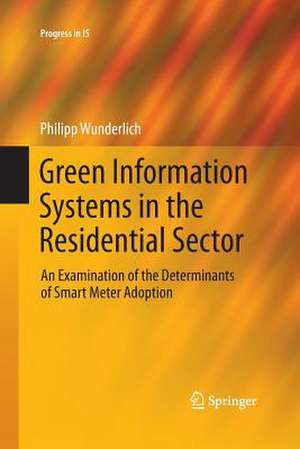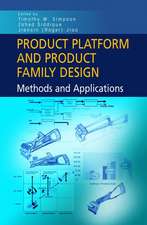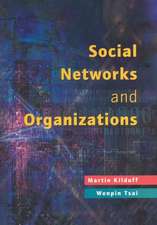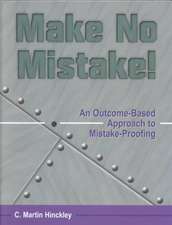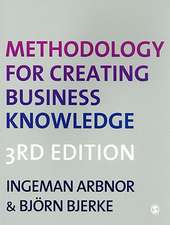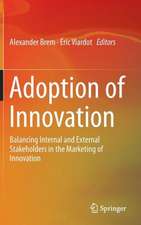Green Information Systems in the Residential Sector: An Examination of the Determinants of Smart Meter Adoption: Progress in IS
Autor Philipp Wunderlichen Limba Engleză Paperback – 16 mai 2015
However, a challenge to SMT-implementation in residential settings has been its successful adoption by consumers. As many cases in the US, and other parts of the world highlight, such implementation projects have run into resistance from the consumers. Despite these challenges, little research has been conducted on this topic.
This study is one of the first that attempts to fill that void by empirically examining the antecedents of SMT adoption amongst potential customers and a group of SMT users. Specifically, this study developed a model surrounding consumers’ intention to adopt and use SMT, by drawing on theories of adoption and motivational psychology and also by including a set of context-specific variables.
| Toate formatele și edițiile | Preț | Express |
|---|---|---|
| Paperback (1) | 547.11 lei 38-44 zile | |
| Springer Berlin, Heidelberg – 16 mai 2015 | 547.11 lei 38-44 zile | |
| Hardback (1) | 557.76 lei 38-44 zile | |
| Springer Berlin, Heidelberg – 4 mai 2013 | 557.76 lei 38-44 zile |
Din seria Progress in IS
- 15%
 Preț: 581.36 lei
Preț: 581.36 lei - 17%
 Preț: 360.71 lei
Preț: 360.71 lei - 20%
 Preț: 939.29 lei
Preț: 939.29 lei - 18%
 Preț: 1113.09 lei
Preț: 1113.09 lei - 18%
 Preț: 725.43 lei
Preț: 725.43 lei - 15%
 Preț: 586.88 lei
Preț: 586.88 lei - 18%
 Preț: 1113.09 lei
Preț: 1113.09 lei - 8%
 Preț: 564.90 lei
Preț: 564.90 lei -
 Preț: 395.25 lei
Preț: 395.25 lei -
 Preț: 385.62 lei
Preț: 385.62 lei - 24%
 Preț: 936.30 lei
Preț: 936.30 lei - 20%
 Preț: 331.08 lei
Preț: 331.08 lei -
 Preț: 388.13 lei
Preț: 388.13 lei - 15%
 Preț: 646.75 lei
Preț: 646.75 lei - 20%
 Preț: 566.20 lei
Preț: 566.20 lei - 15%
 Preț: 637.59 lei
Preț: 637.59 lei - 18%
 Preț: 844.08 lei
Preț: 844.08 lei - 24%
 Preț: 802.99 lei
Preț: 802.99 lei - 15%
 Preț: 644.30 lei
Preț: 644.30 lei -
 Preț: 385.25 lei
Preț: 385.25 lei - 18%
 Preț: 1251.68 lei
Preț: 1251.68 lei - 20%
 Preț: 314.39 lei
Preț: 314.39 lei -
 Preț: 386.61 lei
Preț: 386.61 lei -
 Preț: 383.50 lei
Preț: 383.50 lei -
 Preț: 382.75 lei
Preț: 382.75 lei - 15%
 Preț: 644.95 lei
Preț: 644.95 lei - 15%
 Preț: 652.64 lei
Preț: 652.64 lei - 18%
 Preț: 954.62 lei
Preț: 954.62 lei - 18%
 Preț: 784.13 lei
Preț: 784.13 lei - 18%
 Preț: 726.69 lei
Preț: 726.69 lei - 15%
 Preț: 646.11 lei
Preț: 646.11 lei - 15%
 Preț: 636.80 lei
Preț: 636.80 lei - 20%
 Preț: 584.19 lei
Preț: 584.19 lei - 15%
 Preț: 658.55 lei
Preț: 658.55 lei - 15%
 Preț: 589.14 lei
Preț: 589.14 lei - 20%
 Preț: 986.01 lei
Preț: 986.01 lei -
 Preț: 421.34 lei
Preț: 421.34 lei - 20%
 Preț: 336.35 lei
Preț: 336.35 lei - 20%
 Preț: 337.00 lei
Preț: 337.00 lei - 15%
 Preț: 644.95 lei
Preț: 644.95 lei
Preț: 547.11 lei
Preț vechi: 683.89 lei
-20% Nou
Puncte Express: 821
Preț estimativ în valută:
104.72€ • 113.79$ • 88.02£
104.72€ • 113.79$ • 88.02£
Carte tipărită la comandă
Livrare economică 17-23 aprilie
Preluare comenzi: 021 569.72.76
Specificații
ISBN-13: 9783642439735
ISBN-10: 364243973X
Pagini: 136
Ilustrații: XVIII, 116 p.
Dimensiuni: 155 x 235 x 7 mm
Greutate: 0.2 kg
Ediția:2013
Editura: Springer Berlin, Heidelberg
Colecția Springer
Seria Progress in IS
Locul publicării:Berlin, Heidelberg, Germany
ISBN-10: 364243973X
Pagini: 136
Ilustrații: XVIII, 116 p.
Dimensiuni: 155 x 235 x 7 mm
Greutate: 0.2 kg
Ediția:2013
Editura: Springer Berlin, Heidelberg
Colecția Springer
Seria Progress in IS
Locul publicării:Berlin, Heidelberg, Germany
Public țintă
ResearchCuprins
Introduction.- Smart Grid.- Theoretical Foundations.- Conceptual Model.- Methodology.- Analysis.- Discussion and Interpretation.- Conclusion.
Notă biografică
Philipp Wunderlich, born 1984 in Stuttgart, received a diploma (MSc equivalent) in Business from the University of Mannheim and was a visiting scholar at the Washington State University, Washington. His research interests include IT service innovations, Green-IS, incentive systems and motivation psychology. His work has been published in various proceedings of leading information systems conferences.
Textul de pe ultima copertă
Given rising electricity consumption, coupled with finite resources, and a growing awareness surrounding sustainable energy, ICT-enabled electrical networks such as smart grids are increasingly being deployed by energy companies. One aspect of smart grids is smart meter technology (SMT), which are sophisticated digital electrical meters, having the potential to increase energy efficiency in both residential and industrial sectors.
However, a challenge to SMT-implementation in residential settings has been its successful adoption by consumers. As many cases in the US, and other parts of the world highlight, such implementation projects have run into resistance from the consumers. Despite these challenges, little research has been conducted on this topic.
This study is one of the first that attempts to fill that void by empirically examining the antecedents of SMT adoption amongst potential customers and a group of SMT users. Specifically, this study developed a model surrounding consumers’ intention to adopt and use SMT, by drawing on theories of adoption and motivational psychology and also by including a set of context-specific variables.
However, a challenge to SMT-implementation in residential settings has been its successful adoption by consumers. As many cases in the US, and other parts of the world highlight, such implementation projects have run into resistance from the consumers. Despite these challenges, little research has been conducted on this topic.
This study is one of the first that attempts to fill that void by empirically examining the antecedents of SMT adoption amongst potential customers and a group of SMT users. Specifically, this study developed a model surrounding consumers’ intention to adopt and use SMT, by drawing on theories of adoption and motivational psychology and also by including a set of context-specific variables.
Caracteristici
Presents latest research on the application of information systems for energy efficiency Includes motivational psychology aspects for better user acceptance Highlights the application of smart meter technology
